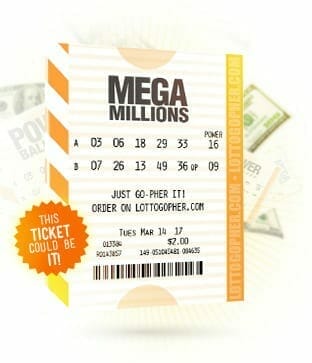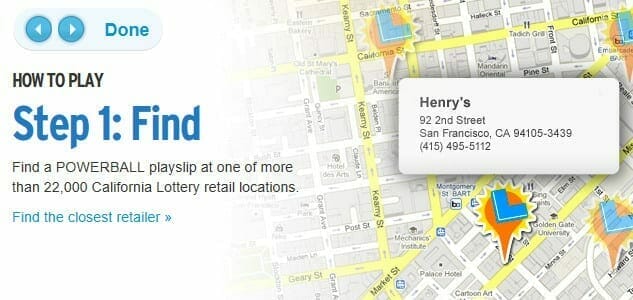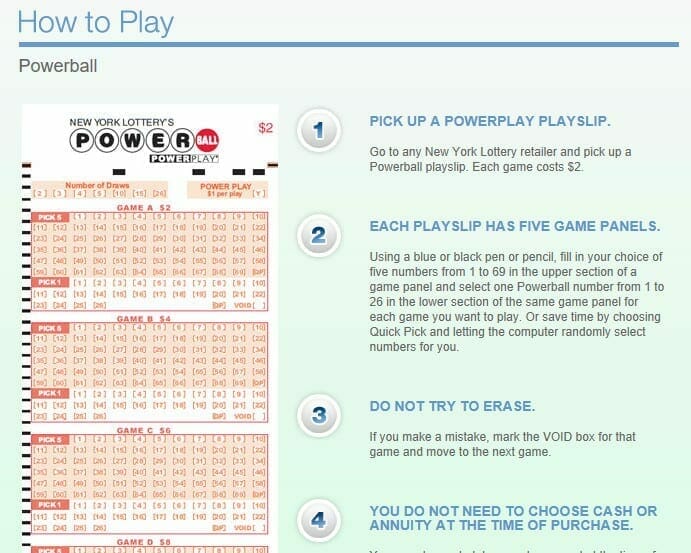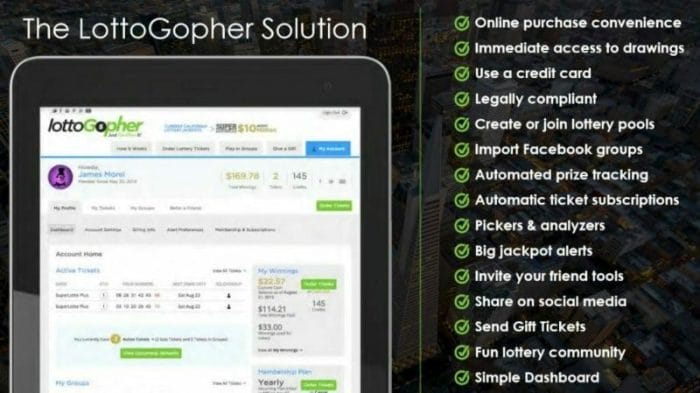I’ve been waiting for a while on this one. Lottogopher (LOTO.C), a company that allows, for the first time, California lottery players to buy tickets online, is about to land on the Canadian public markets this coming Tuesday.
If this doesn’t seem like a big deal to you, this whole ‘online lottery sales’ thing, I’m about to drop some sage on you and you’re going to enjoy it.
In California – in fact, pretty much everywhere in the United States – online lottery ticket purchases have long been illegal, according to federal law.
That’s not because the law was made at some time when ‘online’ wasn’t a thing yet, when you could get tossed in jail for farting in a woman’s direction and dancing to the rock and roll music was considered punishable by gulag. In fact, it’s been a deliberate situation.
The feds made a law in 1961 that specifically banned interstate gambling, and online lottery sales would mean you’re buying tickets on phone lines that criss-cross state lines a bunch, hence, legally squishy.
The states went to the feds about seven years ago to say, hey, that law was about sports betting, not lottery tickets – can we play? And the feds said, meh, kinda, I mean maybe, best not to but if you really insist, okay.
Michigan currently offers online Powerball sales. California does not. In fact, most states do not. Almost all states do not, and for a couple of reasons.
First, if you allowed online lottery sales in California, about half your bodegas would be out of business inside a week. And you do NOT want to piss off Big Bodega. Second, native bands have their own lotteries, and to protect them from getting curbstomped, the states have made it a point to stay out of the online business.
In fact, when you go to buy a Powerball ticket in California, you’re met with this helpful screen:
Step 1: Go F yourself. Hit the bodega, and stand in line behind grandpa as he blows through his retirement payout at $3 per shot, and has the minimum wage clerk check each of his 900 tickets, one at a time, by hand.
Step 2: Profit?
I’ve lived in California. When the Powerball is hot, you avoid convenience stores like Donald Trump avoids vegetables. Nobody feels proud to be standing in line at the 7/11 at the best of times, but that Big Gulp and Boston Cream start to feel particularly shameful when you’re standing there holding it for 32 minutes while gramps reinvests his $0.75 winnings.
From VentureBeat:
With out-of-state hopefuls flocking to California to purchase tickets for tomorrow’s half-a-billion MEGA Millions Lottery Jackpot, lines have been building up throughout the week. Some shops have reported wait times of over three hours. However, California residents looking to throw their name in the hat for the record-breaking jackpot won’t even need to leave the comfort of their home thanks to LottoGopher.com. LottoGopher is the only legal and secure online site that handles ticket orders, even offering services for office pools, where friends and co-workers can combine forces to increase their chances of winning the largest MEGA Millions jackpot in the history of the universe (that we know of).
Nary a month goes by without news that some office syndicate has won a big prize, and the office has descended into armed combat because nobody can agree whether Phil from Accounting should get to keep his piece when he didn’t get his cash into Mavis at the front desk by 3pm and AAARGH!
The lottery is ass. And it’s ass precisely because it’s run like a Monday morning convention of Department of Motor Vehicles employees. Consider Washington State, where if you win a prize, you have to download and print this form, staple your ticket to it, then mail it in or walk it into their office. Or send it via the Pony Express maybe.
In Maryland, if you want to play online, the first handful of search results go to websites that aren’t the Maryland lottery at all, but are designed to look like it. The actual Maryland lottery has an app, but you can’t use it to buy tickets, only to check your tickets.
In New York state, when you try to buy a ticket online, you might as well be trying to import a Russian bride to a trailer park using a telegram office in Schenectady. Here’s how you play in the modern day:
I’ve placed bets at country town greyhound racing tracks that used more modern tech than this. How many pencils were killed to allow the NY State Powerball to live? Should I use a bingo blotter on that ticket and have a lucky troll doll handy?
In California, even if you go to a store to buy your lotto ticket, you know how you have to pay for it?
CASH. You can’t stick it on your credit card because Frank has a gambling problem and will blow through the rent if he’s allowed to put his ticket on plastic THANKS FRANK.
So we’ve established this is dumb. Online lottery sales make sense, but big dumb US state government departments don’t innovate, and big change, like setting up the IT backend and security and legislation to make online gambling a government approved thing take years, not months. Maybe decades.
This leaves a gaping maw of opportunity for Lottogopher.
Now, I know what you’re thinking – “If online lottery ticket sales aren’t legal, how is Lottogopher making them happen?”
In short, it isn’t. You go to the Lottogopher website, pick your game, pick your numbers, pick your number of plays, set up your profile or your office syndicate, and you pay for your tickets like you would at the bodega.
Lottogopher then ‘goes fer’ your tickets by sending one of their gophers to a given convenience store and literally, by hand, runs all the tickets from that day through the system – as is the legally mandated process for buying a ticket. I realize this seems archaic, that maybe there should be some sort of API they can tie into where their computers talk to the California Lottery’s computers – but that functionality doesn’t exist at CA Lotto HQ, so they have to do it old school.
They scan the resulting tickets, which are uploaded to your account, they notify you if you win something, they show you that Phil from Accounting didn’t get his bloody ticket money in again before the cut off, and everyone in the office can login and see if they won.
The company says, “Winning player accounts are then funded with 100% of their prize money. LottoGopher keeps no portion of the prizes, large or small.” LottoGopher users remain the legal owners of any lottery tickets ordered, and a “sophisticated system tracks orders, ticket transportation and a secure storage vault.”
It’s like Uber for lottery tickets.
So we’ve established the opportunity, now let’s move to the legitimacy.
Lottogopher isn’t an idea out of a Howe Street pump shop, it’s actually been in business for several years. The company has been getting consistent mainstream media press since 2010, and ran for a few years in alpha mode before the constant demand for their services saw them pause as their website and staffing began to strain.
This is why they’ve come north to go public – so they can scale their growth quickly, raise money to expand as needed, and move fast enough to stay beyond anyone else who gets an idea to try the same routine.
The profit potential? Stop me if you’ve heard this one before: Free for limited service, $3 per day for a one off membership, $12 for a monthly account, and $99 for one years.
Fair.
In the alpha runs, the company had no trouble signing up users, and that shouldn’t be a problem going forward because MARKETING. Wanna get folks to your lottery website? Just buy Google and Facebook ads for the word ‘lotto’ and you’re good to go.
And, not for nothing, but the most Googled word last year? “Powerball.”
Fully diluted, it looks like there’s about 82 million shares out when it lands on the market. The company plans to move into 22 other US states in quick time, of the 42 that have lotteries.
Of course, any of those states could just west up their own online sales. How hard could it be?
Turns out, it’s bloody hard because first you’ve got the retailers up in arms, then the anti-gambling folks, then the purists, then the bureaucrats. Meanwhile, Lottogopher isn’t competing against the California lottery – it’s BUYING IN to the lottery. With Lottogopher doing business, California lottery sales will rise, and the resulting tax revenue will do likewise.
There’s simply no incentive for California to go up against Lottogopher, and in fact the company met with the lottery muckymucks in 2010, and got the nod from regulators to say they’re doing things in compliance with all laws. If California had plans to shove them aside, they’ve had seven years to enact them and haven’t yet.
I’ve bought in. I hold Lottogopher stock because I think this is a good deal, and I’m writing this for the same reason. Maybe the market will hate it. Maybe it’ll struggle to get the story out. Maybe lotteries are too weird for investors. I don’t know, but I know I like how this deal came together, I like the guys running the show, and the only guy to have ever lost money running a gambling operation is Donald Trump.
One last point: The European online lottery giant Lottoland, which runs online lottery sales in Australia, the UK, Sweden, Portugal, Austria, France, Germany, and Ireland, and earned an estimated €500 million in revenue in 2016, is partnered up with Lottogopher. When the time comes to launch this thing in 22 states, they’ll have the cash, the knowledge, and the tech required to make it go, not to mention a potential acquirer.
I’m in.
[pdf-embedder url=”https://e4njohordzs.exactdn.com/wp-content/uploads/2017/05/lottogopher_presentation_web.pdf”]
[pdf-embedder url=”https://e4njohordzs.exactdn.com/wp-content/uploads/2017/05/lottoGopher_factsheet-1.pdf” title=”lottoGopher_factsheet (1)”]
— Chris Parry
FULL DISCLOSURE: As stated, I bought into a recent Lottogopher financing.





82 Million FD
Please check the official circular that came out today and update your post. Below official fact sheet will help .
https://lottogopher.com/assets/lglite2/img/lottoGopher_factsheet.pdf
Thanks Sarb, appreciate it.
My pleasure Chris. Enjoyed reading your article as always 🙂
I guess lottoland owns 20%, which is a biggie. I tried to search more on who else owns what percentage, but could not get much help today.
If you know or aware of that, please update on your post.
Thanks once again.